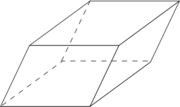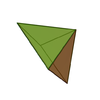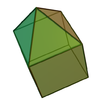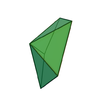
Cyclic symmetries
Encyclopedia
This article deals with the four infinite series of point groups in three dimensions
(n≥1) with n-fold rotational symmetry
about one axis (rotation
by an angle of 360°/n does not change the object), and no other rotational symmetry (n=1 covers the cases of no rotational symmetry at all):
Chiral:
Achiral:
× C2); for n=1 this is denoted by Cs (1*) and called reflection symmetry
, also bilateral symmetry.Cnv (*nn) of order 2n - pyramidal symmetry (abstract group Dn); in biology C2v is called biradial symmetry. For n=1 we have again Cs (1*).
S2n (n×) of order 2n (not to be confused with symmetric group
s, for which the same notation is used; abstract group C2n); for n=1 we have S2 (1×), also denoted by Ci; this is inversion symmetry
They are the finite symmetry group
s on a cone
. For n = they correspond to four frieze group
they correspond to four frieze group
s. Schönflies
notation is used, and, in parentheses, orbifold notation. The terms horizontal (h) and vertical (v) are used with respect to a vertical axis of rotation.
Cnh (n*) has reflection symmetry
with respect to a plane perpendicular to the n-fold rotation axis.
Cnv (*nn) has vertical mirror planes. This is the symmetry group for a regular n-sided pyramid
.
S2n (n×) has a 2n-fold rotoreflection
axis, also called 2n-fold improper rotation axis, i.e., the symmetry group contains a combination of a reflection in the horizontal plane and a rotation by an angle 180°/n. Thus, like Dnd, it contains a number of improper rotations without containing the corresponding rotations.
C2h (2*) and C2v (*22) of order 4 are two of the three 3D symmetry group types with the Klein four-group
as abstract group. C2v applies e.g. for a rectangular tile with its top side different from its bottom side.
Point groups in three dimensions
In geometry, a point group in three dimensions is an isometry group in three dimensions that leaves the origin fixed, or correspondingly, an isometry group of a sphere. It is a subgroup of the orthogonal group O, the group of all isometries that leave the origin fixed, or correspondingly, the group...
(n≥1) with n-fold rotational symmetry
Rotational symmetry
Generally speaking, an object with rotational symmetry is an object that looks the same after a certain amount of rotation. An object may have more than one rotational symmetry; for instance, if reflections or turning it over are not counted, the triskelion appearing on the Isle of Man's flag has...
about one axis (rotation
Rotation
A rotation is a circular movement of an object around a center of rotation. A three-dimensional object rotates always around an imaginary line called a rotation axis. If the axis is within the body, and passes through its center of mass the body is said to rotate upon itself, or spin. A rotation...
by an angle of 360°/n does not change the object), and no other rotational symmetry (n=1 covers the cases of no rotational symmetry at all):
Chiral:
- Cn (nn) of order n - n-fold rotational symmetry (abstract group CnCyclic groupIn group theory, a cyclic group is a group that can be generated by a single element, in the sense that the group has an element g such that, when written multiplicatively, every element of the group is a power of g .-Definition:A group G is called cyclic if there exists an element g...
); for n=1: no symmetry (trivial group)
Achiral:
- Cnh (n*)
Cyclic group
In group theory, a cyclic group is a group that can be generated by a single element, in the sense that the group has an element g such that, when written multiplicatively, every element of the group is a power of g .-Definition:A group G is called cyclic if there exists an element g...
× C2); for n=1 this is denoted by Cs (1*) and called reflection symmetry
Reflection symmetry
Reflection symmetry, reflectional symmetry, line symmetry, mirror symmetry, mirror-image symmetry, or bilateral symmetry is symmetry with respect to reflection. That is, a figure which does not change upon undergoing a reflection has reflectional symmetry.In 2D there is a line of symmetry, in 3D a...
, also bilateral symmetry.
Symmetric group
In mathematics, the symmetric group Sn on a finite set of n symbols is the group whose elements are all the permutations of the n symbols, and whose group operation is the composition of such permutations, which are treated as bijective functions from the set of symbols to itself...
s, for which the same notation is used; abstract group C2n); for n=1 we have S2 (1×), also denoted by Ci; this is inversion symmetry
They are the finite symmetry group
Symmetry group
The symmetry group of an object is the group of all isometries under which it is invariant with composition as the operation...
s on a cone
Cone (geometry)
A cone is an n-dimensional geometric shape that tapers smoothly from a base to a point called the apex or vertex. Formally, it is the solid figure formed by the locus of all straight line segments that join the apex to the base...
. For n =
 they correspond to four frieze group
they correspond to four frieze groupFrieze group
A frieze group is a mathematical concept to classify designs on two-dimensional surfaces which are repetitive in one direction, based on the symmetries in the pattern. Such patterns occur frequently in architecture and decorative art...
s. Schönflies
Arthur Moritz Schönflies
Arthur Moritz Schoenflies , sometimes written as Schönflies, was a German mathematician, known for his contributions to the application of group theory to crystallography, and for work in topology....
notation is used, and, in parentheses, orbifold notation. The terms horizontal (h) and vertical (v) are used with respect to a vertical axis of rotation.
Cnh (n*) has reflection symmetry
Reflection symmetry
Reflection symmetry, reflectional symmetry, line symmetry, mirror symmetry, mirror-image symmetry, or bilateral symmetry is symmetry with respect to reflection. That is, a figure which does not change upon undergoing a reflection has reflectional symmetry.In 2D there is a line of symmetry, in 3D a...
with respect to a plane perpendicular to the n-fold rotation axis.
Cnv (*nn) has vertical mirror planes. This is the symmetry group for a regular n-sided pyramid
Pyramid
A pyramid is a structure whose outer surfaces are triangular and converge at a single point. The base of a pyramid can be trilateral, quadrilateral, or any polygon shape, meaning that a pyramid has at least three triangular surfaces...
.
S2n (n×) has a 2n-fold rotoreflection
Improper rotation
In 3D geometry, an improper rotation, also called rotoreflection or rotary reflection is, depending on context, a linear transformation or affine transformation which is the combination of a rotation about an axis and a reflection in a plane perpendicular to the axis.Equivalently it is the...
axis, also called 2n-fold improper rotation axis, i.e., the symmetry group contains a combination of a reflection in the horizontal plane and a rotation by an angle 180°/n. Thus, like Dnd, it contains a number of improper rotations without containing the corresponding rotations.
C2h (2*) and C2v (*22) of order 4 are two of the three 3D symmetry group types with the Klein four-group
Klein four-group
In mathematics, the Klein four-group is the group Z2 × Z2, the direct product of two copies of the cyclic group of order 2...
as abstract group. C2v applies e.g. for a rectangular tile with its top side different from its bottom side.
Examples
| S2/Ci (1x): | C4v (*44): | C5v (*55): | |
|---|---|---|---|
 Parallelepiped Parallelepiped In geometry, a parallelepiped is a three-dimensional figure formed by six parallelograms. By analogy, it relates to a parallelogram just as a cube relates to a square. In Euclidean geometry, its definition encompasses all four concepts... |
 Square pyramid Square pyramid In geometry, a square pyramid is a pyramid having a square base. If the apex is perpendicularly above the center of the square, it will have C4v symmetry.- Johnson solid :... |
 Elongated square pyramid Elongated square pyramid In geometry, the elongated square pyramid is one of the Johnson solids . As the name suggests, it can be constructed by elongating a square pyramid by attaching a cube to its square base... |
 Pentagonal pyramid Pentagonal pyramid In geometry, a pentagonal pyramid is a pyramid with a pentagonal base upon which are erected five triangular faces that meet at a point . Like any pyramid, it is self-dual.... |

